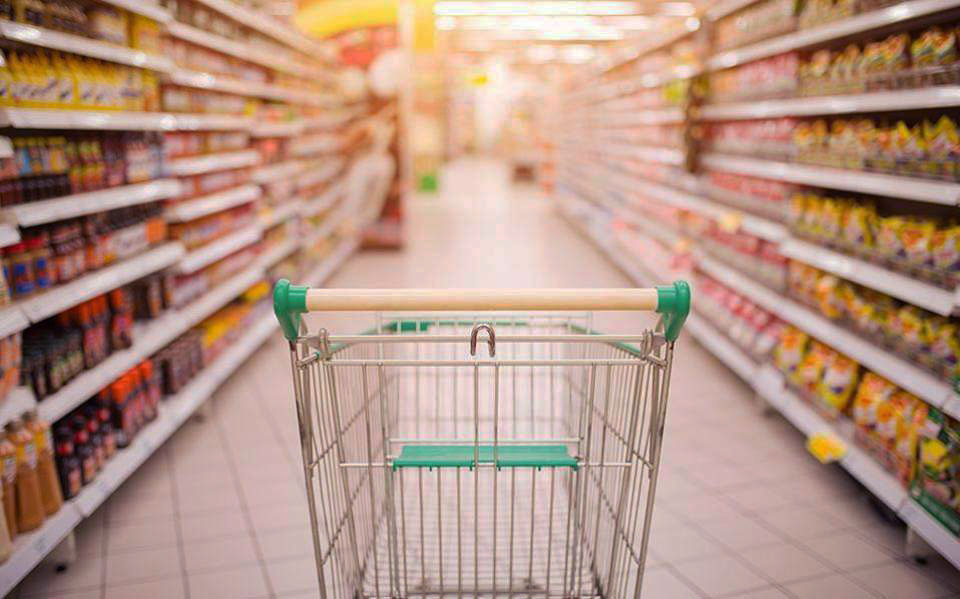
With the price rally in food items continuing despite falling inflation, the domestic food and beverage industry is facing multiple challenges in order to maintain but above all enhance its momentum, both within the country and abroad.
Consumers who have suffered a reduction in their income and the guarantee of food sufficiency remain a key priority for the Greek food and beverage industry, the president of the Association of Greek Food Industries-SEBT, Mr. Ioannis Yotis, pointed out during yesterday’s annual General Meeting of the members of the Association.
SEBT’s commitment to the development of more sustainable food systems
However, he pointed out “unfortunately, however, geopolitical turmoil has consolidated, while inflationary pressures continue to leave their mark. The negative effects of crises are not easy to reverse immediately.”
At the same time, pointing out that “businesses in the sector are facing sustainability issues similar to last year, such as the increased costs of energy and raw materials, the reduced purchasing power of consumers and delays in the absorption of financial tools” he emphasized that “we want the state to help and not be against us”.
Private label on full “offensive”
Despite large price increases recorded by private label products, their share is growing impressively, posing yet another strong challenge to the domestic food industry.
Based on the data presented by Mr. Panagiotis Boretos, managing director of Circana (former IRI), in the period January – April 2023 the total share of private labels reached 19.3%, when the corresponding quarter of 2022 was 16%.
There is a big increase in private label dairy products, as from 13.4% last year they show a share this year to 15.8%, in frozen foods from 21% they go to 22.3%, in non-alcoholic beverages from 5.8% they go to 6.7%.
In all packaged codes, private labels show a market share of 21.7% from 20.2% last year.
It is worth noting that the growth rate of private label products is higher compared to the entire food category, with turnover in consumer staples in the four months January – April 2023 rising 9.3%, while in food the growth is 8.2 % in value but volumes are down 0.9% when the average appreciation stands at 9.2%.
On the contrary, the prices of private label products recorded a high increase of 13%, indicative of the dairy price increases which exceeded 15.7%. Despite this, there is a significant boost in volume sales, as the price gap in relation to branded brands remains large.
It is characteristic that based on Circana’s measurements, the top 60 product categories in the first five months of 2023 will increase by 10.5% in value, with branded products registering growth of 8.6% and private label by 20%.
In terms of volume, branded products are down (–0.7%), while private label sales are up around 5%.
Branded products increase their prices by 9.3% when PLs show a price increase of 14.4%.
The basket of 60 branded products cost 190 euros last year, while this year the same basket costs 207 euros.
Accordingly, the same basket with private label from 131 euros last year costs 139 euros this year, with the “scissors” in prices remaining large.
An important factor for the “invasion” of private label products was the “household basket” and as noted by Mr. Boretos, “the branded products that did not have a price reduction and entered the household basket had almost no growth.”
The causes of inflation and the threat to competitiveness
“The two causes of triggering inflation: monetary policy in the period of the covid crisis and the energy crisis, have launched an autonomous course for prices, creating a spiral with wages as well”, pointed out Mr. Nikos Vettas, General Director of The Foundation for Economic & Industrial Research (IOBE) & Professor at Athens Economics University.
According to Mr. Vettas, “if in the next three to four years the rate of inflation domestically is not lower than the rate of inflation in other European countries, we will lose competitiveness. The sector’s exports have been on the rise in recent years, but the level is still lower than the corresponding products exported by other countries. It is difficult to maintain high export rates when the macroeconomics of the target markets, to which you are targeting your exports, are limited.”
In fact, Mr. Vettas, commenting on the idea that inflation is a good thing because it inflates private and public debts and brings unexpected profits to the public through price increases and indirect taxes, said that “temporarily it certainly “buys” you time, but in the long run it will it is wrong for economic policy to support inflationary policies because a large part of the households that will not be able to afford it”.
Latest News

DM Dendias: We talk With Turkey But We Always Bring Up Their Unacceptable Positions
Second and last day of closely watched conference, entitled 'Metapolitefsi 1974-2024: 50 Years of Greek Foreign Policy', also included appearances by PM Mitsotakis, Ex-PM Tsipras and PASOK leader Nikos Androulakis, among others

Rhodes Airport Tops Fraport Greece’s Regional Airports in 2024 Performance
According to Fraport's data, more than 35 million passengers (specifically 35.2 million) were handled by Fraport-managed airports during the 11 months.

European Central Bank Cuts Interest Rates by 25 Basis Points
It is the fourth cut of interest rates by Europe’s central bank, a move expected by the markets and financial analysts leading to the rate settling at 3%.

Airbnb: New Measures Add €600 in Extra Costs for Property Owners
Property managers face an immediate administrative fine of 5,000 euros if access to the inspected property is denied or any of the specified requirements are not met.

Economist: Greece Included in the Best Performing Economies in 2024
Meanwhile, Northern European countries disappoint, with sluggish performances from the United Kingdom and Germany.

EasyJet Expands Its Routes from Athens
The airline’s two new routes will be to London Luton and Alicante and they will commence in summer 2025.

Capital Link Forum Highlights Greece’s Economic Resurgence; Honors BoG Gov Stournaras
Capital Link Hellenic Leadership Award recipient, Bank of Greece Gov. Yannis Stournaras, an ex-FinMin, was lauded for his pivotal role during Greece’s economic recovery

Tourist Spending in Greece Up by 14%, Visa Card Analysis Shows
Greece’s capital Athens emerged as the most popular destination, recording a 17% increase in transactions with Visa cards, surpassing even the cosmopolitan island of Mykonos.

Inflation in Greece Unchanged at 2.4% in Nov. 2024
The general consumer price index (CPI) posted a 0.4% decrease in November compared to the previous month

2024 Christmas Holidays: Extended Shop Hours Schedule
The 2024 Christmas Holidays extended shop hours schedule commences on Thursday, December 12 and runs until the end of the year.


![Φυσικό αέριο: Δυναμικό come back του LNG στην Ελλάδα [γραφήματα]](https://www.ot.gr/wp-content/uploads/2023/01/OT_naturalgas-90x90.jpeg)












![Fraport: Πάνω από 35 εκατ. επιβάτες στα αεροδρόμια το 11μηνο – Πτώση στη Μύκονο [πίνακας]](https://www.ot.gr/wp-content/uploads/2022/06/fraport-90x90.jpg)


























 Αριθμός Πιστοποίησης Μ.Η.Τ.232433
Αριθμός Πιστοποίησης Μ.Η.Τ.232433